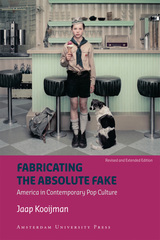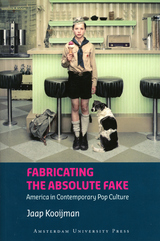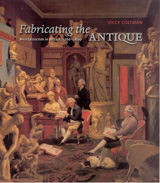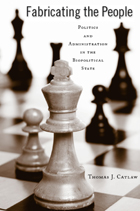4 books about Fabricating

Fabricating the Absolute Fake - revised edition
Jaap Kooijman
Amsterdam University Press, 2014
When rock star Bono told Oprah Winfrey that America is an ideal that is supposed to be contagious, the talk show host was moved to tears. Such an imagined America, rather than the nation-state USA, is the topic of Fabricating the Absolute Fake. Pop and politics become intertwined, as Hollywood, television, and celebrities spread the American Dream around the world. Using concepts such as the absolute fake and karaoke Americanism, the book examines this global mediation as well as the way America is appropriated in pop culture produced outside of the USA, as demonstrated by such diverse cultural icons as the Elvis-inspired crooner Lee Towers and the Moroccan-Dutch rapper Ali B. This revised and extended edition includes a new chapter on Barack Obama and Michael Jackson as global celebrities and a new afterword on teaching American pop culture.
[more]

Fabricating the Absolute Fake
'America' in Contemporary Pop Culture
Jaap Kooijman
Amsterdam University Press, 2008
From the pageantry of Oprah Winfrey’s daytime talk show to the Atlanta-based Coca-Cola empire, American “pop” culture—and the contemporary films, television programs, and cultural objects that determine it—dominates the rest of the world through its hegemonic presence. Does that make everyone a hybridized American or do these elements find mediation within the other cultures that consume them? Fabricating the Absolute Fake applies elements of postmodern theory—Jean Baudrillard’s hyperreality and Umberto Eco’s “absolute fake”, among others—to this globally mediated American pop culture in order to examine both the phenomenon itself and its specific appropriation in the Netherlands, as evidenced by diverse cultural icons like the Elvis-inspired crooner Lee Towers, the Moroccan-Dutch white rapper Ali B, musical tributes to an assassinated politician, and the Dutch reality soap opera scene.
A fascinating exploration of how global cultures struggle to create their own “America” within a post–September 11 media culture, Fabricating the Absolute Fake reflects on what it might mean to truly take part in American popular culture.
“A brilliant, thoroughly enjoyable work of cultural critique. . . . Jaap Kooijman takes seemingly exhausted concepts like “Americanization” and turns them on their head.”—Anne McCarthy, New York University
[more]

Fabricating the Antique
Neoclassicism in Britain, 1760-1800
Viccy Coltman
University of Chicago Press, 2006
Between 1760 and 1800, British aristocrats became preoccupied with the acquisition of ancient Greek and Roman artifacts. From marble busts to intricately painted vases, these antiquities were amassed in vast collections held in country houses and libraries throughout Britain. In Fabricating the Antique, Viccy Coltman examines these objects and their owners, as well as dealers, restorers, designers, and manufacturers. She provides a close look at the classical revival that resulted in this obsession with collecting antiques.
Looking at the theoretical foundations of neoclassicism, Coltman contends this reinvention of ancient material culture was more than a fabrication of style. Based in the strong emphasis on classical education during this time, neoclassicism, Coltman claims, could be more accurately described as a style of thought translated into material possessions. Fabricating the Antique is a new take on both well-known collections of ancient art and newly cataloged artifacts. This book also covers how these objects—once removed from their original context—were received, preserved, and displayed. Art historians, classicists, and archaeologists alike will benefit from this important examination of British eighteenth-century history.
Looking at the theoretical foundations of neoclassicism, Coltman contends this reinvention of ancient material culture was more than a fabrication of style. Based in the strong emphasis on classical education during this time, neoclassicism, Coltman claims, could be more accurately described as a style of thought translated into material possessions. Fabricating the Antique is a new take on both well-known collections of ancient art and newly cataloged artifacts. This book also covers how these objects—once removed from their original context—were received, preserved, and displayed. Art historians, classicists, and archaeologists alike will benefit from this important examination of British eighteenth-century history.
[more]

Fabricating the People
Politics and Administration in the Biopolitical State
Thomas J. Catlaw
University of Alabama Press, 2012
Since the 1960s, hostility and mistrust toward the U.S. government has risen precipitously. At the same time, the field of public administration has wrestled with its own crisis of legitimacy. What is at the root of current antigovernment sentiment? Conventionally, two explanations for this problem persist. Some see it primarily in moral terms, a deficit of Constitutional or democratic values in government. Others emphasize government’s performance failures and managerial inefficiency.
Thomas J. Catlaw departs from both explanations in this groundbreaking study and demonstrates that the current crisis of government originates in the uncritical manner in which we have accepted the idea of “the People.” He contends that this unifying, foundational concept—and the notion of political representation it entails—have failed. While illuminating some of our most pressing social and political problems, Catlaw shows how the idea of the People, far from serving to unify, relies in fact on a distinctive logic of exclusion. True political power is the power to determine what constitutes the normal, natural life of the electorate. Today, the exclusionary practices that once made up or fabricated the People are increasingly contested. In turn, government and political power now appear more invasive, less legitimate, and our shared reality appears more fragmented and disconnected.
In order to address this crisis and reinvigorate democracy, Catlaw argues, we must accept as bankrupt the premise of the People and the idea of representation itself. Fabricating the People boldly proposes post-representational governance that reframes the practice of modern democracy and reinvents the role of public administration.
[more]
READERS
Browse our collection.
PUBLISHERS
See BiblioVault's publisher services.
STUDENT SERVICES
Files for college accessibility offices.
UChicago Accessibility Resources
home | accessibility | search | about | contact us
BiblioVault ® 2001 - 2024
The University of Chicago Press









